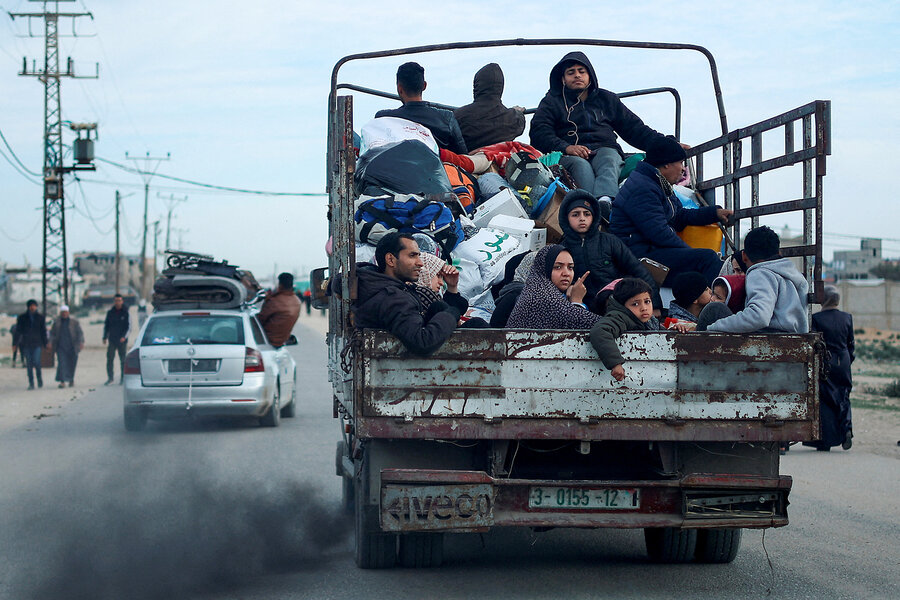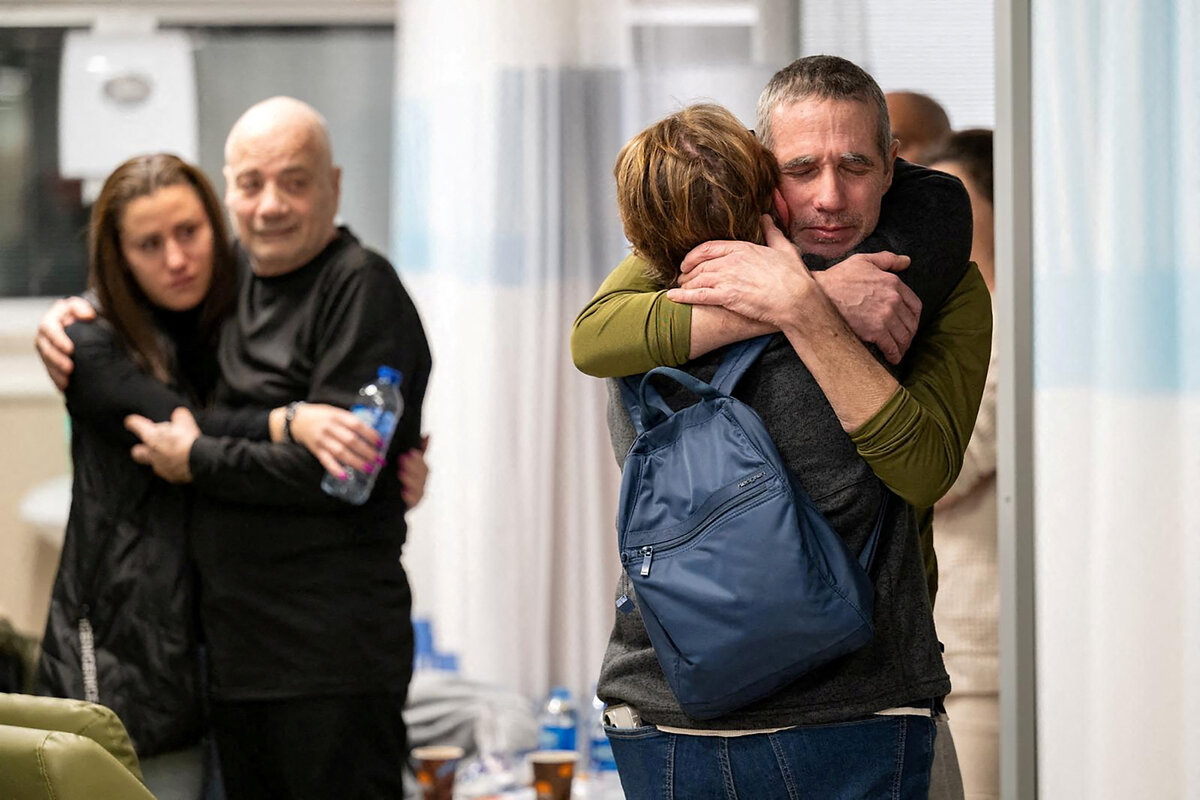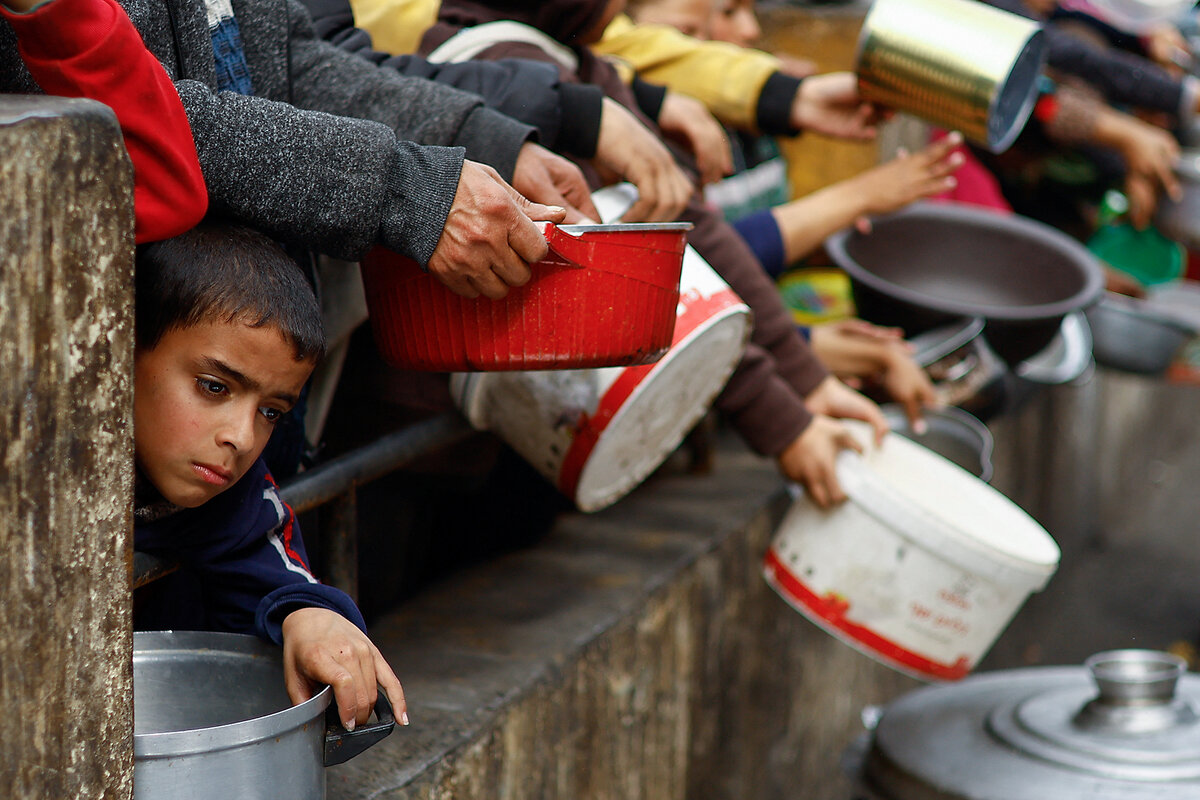As Israel zeroes in on Rafah, its aims – and concerns – are clear
Loading...
| TEL AVIV, Israel
Over the past two weeks, in nearly every public statement, Israeli leaders have made their future target in the war in Gaza clear: Rafah.
Gaza’s southernmost city sits astride the frontier with Egypt and is, according to Israeli officials, Hamas’ last redoubt after more than four months of devastating conflict. The city is also now home to more than 1 million displaced Palestinians. Even world leaders deemed supportive of Israel have voiced their concerns.
Why We Wrote This
A story focused onWhen Israel rescued two Hamas-held hostages from Rafah, the operation raised sharp concerns among Israel’s friends and partners that the long-signaled move into the overcrowded city had begun. Those concerns are adding to Israel’s own.
U.S. President Joe Biden’s statement to reporters Monday was adamant: “The major military operation in Rafah should not proceed without a credible plan for ensuring the safety and support ... of the people sheltering there. They need to be protected!”
An especially sensitive consideration for Israel is its peaceful relationship with Egypt, which has sounded its own warnings.
“Rafah is more complicated now, and Egypt is reacting,” says Michael Milshtein, a former Israeli intelligence officer. “Israel is very concerned by Egypt’s reaction and is sensitive to it.”
For any such operation to move ahead, two Israeli officials said, a mass evacuation plan from Rafah would first have to be formulated and then implemented.
“There’s no reality that we don’t deal with Rafah,” says one senior Israeli military officer. “The question is how you deal with it.”
Over the past two weeks, in nearly every public statement, Israeli leaders have made their future target in the war in Gaza clear: Rafah.
Gaza’s southernmost city sits astride the frontier with Egypt and is, according to Israeli officials, Hamas’ last redoubt after more than four months of devastating conflict that followed the militant organization’s Oct. 7 attack on Israel.
The city is also now home to more than 1 million displaced Palestinians, quadruple its prewar population, who fled from the shattered enclave’s north as Israeli ground forces moved in.
Why We Wrote This
A story focused onWhen Israel rescued two Hamas-held hostages from Rafah, the operation raised sharp concerns among Israel’s friends and partners that the long-signaled move into the overcrowded city had begun. Those concerns are adding to Israel’s own.
Even world leaders deemed supportive of Israel have voiced their concerns for Rafah and issued severe warnings to the Jewish state.
“We want Israel to stop and think very seriously before it takes any further action,” British Foreign Secretary David Cameron said Monday in an interview with Reuters. It is “impossible to see how you can fight a war amongst these people,” he said. “There’s nowhere for them to go.”
U.S. President Joe Biden’s statement to reporters Monday, during a joint appearance at the White House with King Abdullah of Jordan, was adamant.
“The major military operation in Rafah should not proceed without a credible plan for ensuring the safety and support ... of the people sheltering there. They need to be protected!” he said.
An especially sensitive consideration for Israel is its peaceful relationship with Egypt, an important intermediary with Hamas that often cooperates with Israel on Gaza security matters. In recent days, Egypt has reinforced its military presence along the border with Rafah and reiterated its longstanding position that people in Gaza should not be pressed into seeking refuge on its territory.
Hostages rescued in Rafah
Concerns for Palestinian civilians in Rafah were raised Sunday when Israeli special forces, backed by airstrikes, rescued two Israeli civilian hostages being held by Hamas militants in a building in Rafah.
More than 60 Palestinians were reported killed, including militants, in airstrikes that accompanied the rescue operation, but the Israeli forces withdrew. It was just a raid, not a prelude to the threatened incursion.
But Israeli officials, at least outwardly, are adamant that the launch of a large-scale operation is only a matter of time, and inevitable.
“Those who say that under no circumstances should we enter Rafah are basically saying lose the war, keep Hamas there. And Hamas has promised to do the Oct. 7 massacre over and over and over again,” Prime Minister Benjamin Netanyahu told ABC News in an interview Sunday.
And yet, in a nod to international concerns, the long-serving Israeli leader added that he was working on a “detailed plan” to evacuate civilians “out of harm’s way” to unspecified areas in Gaza north of Rafah that the Israeli military has already cleared.
According to several Israeli officials, the focus on Rafah is not mere grandstanding, but a central military objective. The Israeli war plan called for an initial mass ground invasion of the northern Gaza Strip, followed by a southward push into the territory’s central regions and the city of Khan Yunis, just north of Rafah.
Now after dismantling over 18 of Hamas’ 24 battalions, according to Israeli estimates, much of the militant group’s remaining fighting force – four battalions – is in Rafah. As it is the last major population center still controlled by Hamas, the group’s senior leadership, including Yahya Sinwar, may be sheltering among, or in tunnels below, the masses of displaced civilians.
Focus on Egyptian border
But the biggest objective, from the Israeli point of view, is severing Hamas’ control over the border crossing and frontier with Egypt that is the enclave’s commercial and humanitarian lifeline.
Since Hamas’ violent takeover of Gaza in 2007, the group has been able to easily smuggle in arms above and below ground, as well as tax goods entering from Egypt.
“To achieve your war aims, you have to take care of Rafah. It’s the main source that turned Hamas from a nuisance into a monster,” says Michael Milshtein, a former Israeli intelligence officer and expert on Palestinian affairs. “Without Rafah you haven’t done anything.”
And yet with 60% of Gaza’s 2.2 million people crammed into homes, tents, and makeshift shelters, “Rafah is more complicated now, and Egypt is reacting,” adds Dr. Milshtein. “Israel is very concerned by Egypt’s reaction and is sensitive to it.”
Egypt has warned that any Israeli move into Rafah could see desperate Palestinians try to breach the border wall and flee into its territory – a scenario Cairo has warned would be a “red line” which could shake the foundations of the 1979 peace treaty it signed with the Jewish state.
President Biden, on Monday, reiterated his staunch opposition to “any forced displacement of Palestinians from Gaza.”
For these reasons, and despite the tough public rhetoric, one person familiar with Israeli deliberations said there was as yet no plan to launch a major ground operation in Rafah.
“The [Israelis] don’t know what they want to do, and there’s lots of confusion surrounding Rafah,” the person added, alluding to the grave concerns cited by both the United States and Egypt.
For any such operation to move ahead, two Israeli officials said, a mass evacuation plan from Rafah would first have to be formulated and then implemented.
“There’s no reality that we don’t deal with Rafah, since we need to make sure the [Hamas] military wing doesn’t go back to what it was, and that they’re demilitarized,” says one senior Israeli military officer. “The question is how you deal with it.”









